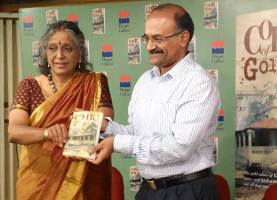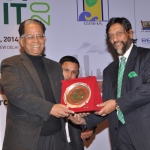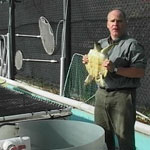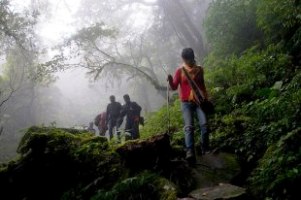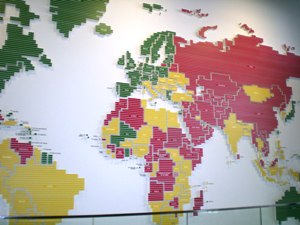The Philippines, a low lying archipelago of more than 90 million people is a perfect laboratory of stories to humanize the impact of environmental problems and concerns. With the influx of people and rapid industrial growth, environmental issues such as: air and water pollution, solid waste management, decline of biodiversity, deforestation, irresponsible mining, and natural resource management are increasingly becoming major concerns.
The country is literally at the doorstep of typhoons, natural disasters and the devastating impact of climate change such as severe drought, floods, heat wave, heavy rains and typhoons. In fact, according to the latest report from the World Bank, the Philippines ranks fifth among the top 10 countries worldwide that will be greatly affected by environmental degradation, specifically displacing 13.6 million people to rising sea levels by 2050.
Yet, despite the country's weak environmental programs and policies and its vulnerability, the Philippine media had paid little attention to reporting on environmental issues and concerns. Most journalists, especially those based in cities, very rarely conduct in-depth reporting or get to visit rural areas where people are on the frontline of environmental problems.
There is, however, much room for improvement in the Philippine media. The challenge to Filipino journalists is to make environmental stories more relevant, interesting and useful to their audiences. Given the urgent need to advance environmental journalism in the Philippines, the Philippine Network of Environmental Journalists (PNEJ) aims to improve the reach, quality, and sustainability of local media, as well as to connect to various sectors in the society about environment and development issues. The PNEJ aims to strengthen the communication and collaboration between environment journalists from Philippines and from that of other countries such as China, Vietnam, Indonesia, Brazil, Greater Horn of Africa, Mexico, India with network of environmental journalists.
There is generally less coverage of climate change, for instance, in countries like the Philippines partly due to other pressing policy priorities such as poverty and development challenges. Although covering environment is not as appealing as it is compared to other beats, journalists should continue to engage in the country's environmental challenges. We need more journalists to understand and report climate change and other issues that come with it - poverty, economics, health and security, among others.
PNEJ also offer unique services for working journalists through seminars or conferences, study tours, links to other media organizational locally and internationally, awards for the best environmental reporting, and other activities. To boost the quality and quantity of environmental reporting in the Philippines, the year-long fellowship program on Environmental Investigative Reporting supported and organized by the Washington-based International Women's Media Foundation (IWMF) through funding from Dole Food Company, was launched on World Environment Day in June this year. This fellowship program is designed to develop 10 senior journalists with expertise in this field.
"The fellows will gain skills necessary to produce in-depth reports on a wide range of issues related to the environment highlighting the role of the community, especially women in confronting it," said Nadine Hoffman, IWMF's Director of Programs.
Within their fellowship year, the reports produced by participating journalists will be disseminated through broadcast, print and online news outlets. They will learn how to produce investigative reports, present it in a multimedia platform, newspapers or online, attend lectures on media ethics, environmental reporting, embark on field trip and meet sources from various sectors in the environment area.
Hoffman explained that to address communicating the critical gap of addressing environmental problems in the country, journalists need to equip themselves, produce innovative reports about environmental problems and solutions and incorporate women's role on the issues.
The 10 fellows will complete at least three investigations for their news organizations within a year. The fellows were:
Kristine L. Alave, GMA News
Bernardino Balabo, Radyo Bulacan
Riziel Ann Cabreros, ABS-CBN News Channel
Rouchelle Dinglasan, GMA News Online
Lira Dalangin-Fernandez, Interaksyon (TV 5 Online)
Marilou Guieb, Business Mirror Purple Romero, Rappler
Romer Sarmiento, MindaNews
Anna Valmero, LOQAL.ph
Rhodina Villanueva, Philippine Star
Included in the planned stories of the fellows are climate change, biodiversity, mining issues, flooding in low lying areas, waste mismanagement, pollution, among other pressing environmental issues in the Philippines.
"The IWMF training workshop is a good way for us to hone our skills in reporting about environmental issues, as well as highlighting the role of women in our reports. The quality of lectures as well as the speakers are great and it is helping us to excel more in this field," said fellow Purple Romero from Rappler, an online news platform.
Armed with guides, tips and resources, including how to use social media in investigative reporting, journalists will produce innovative reports about environmental problems and solutions, incorporating women's role in and perspectives on environmental issues.
"I am positive that with this kind of training we are receiving, more and more journalists will be interested in writing about environment, especially those coming from the provinces," said fellow Bernardino Balabo from Radyo Bulacan.








